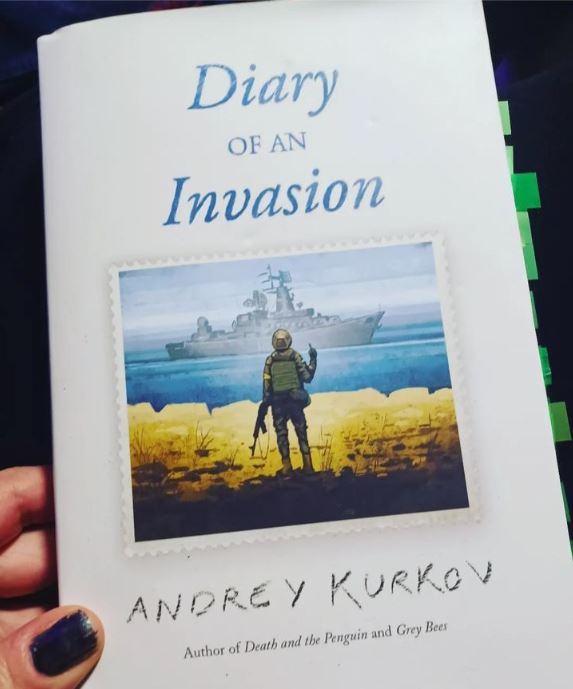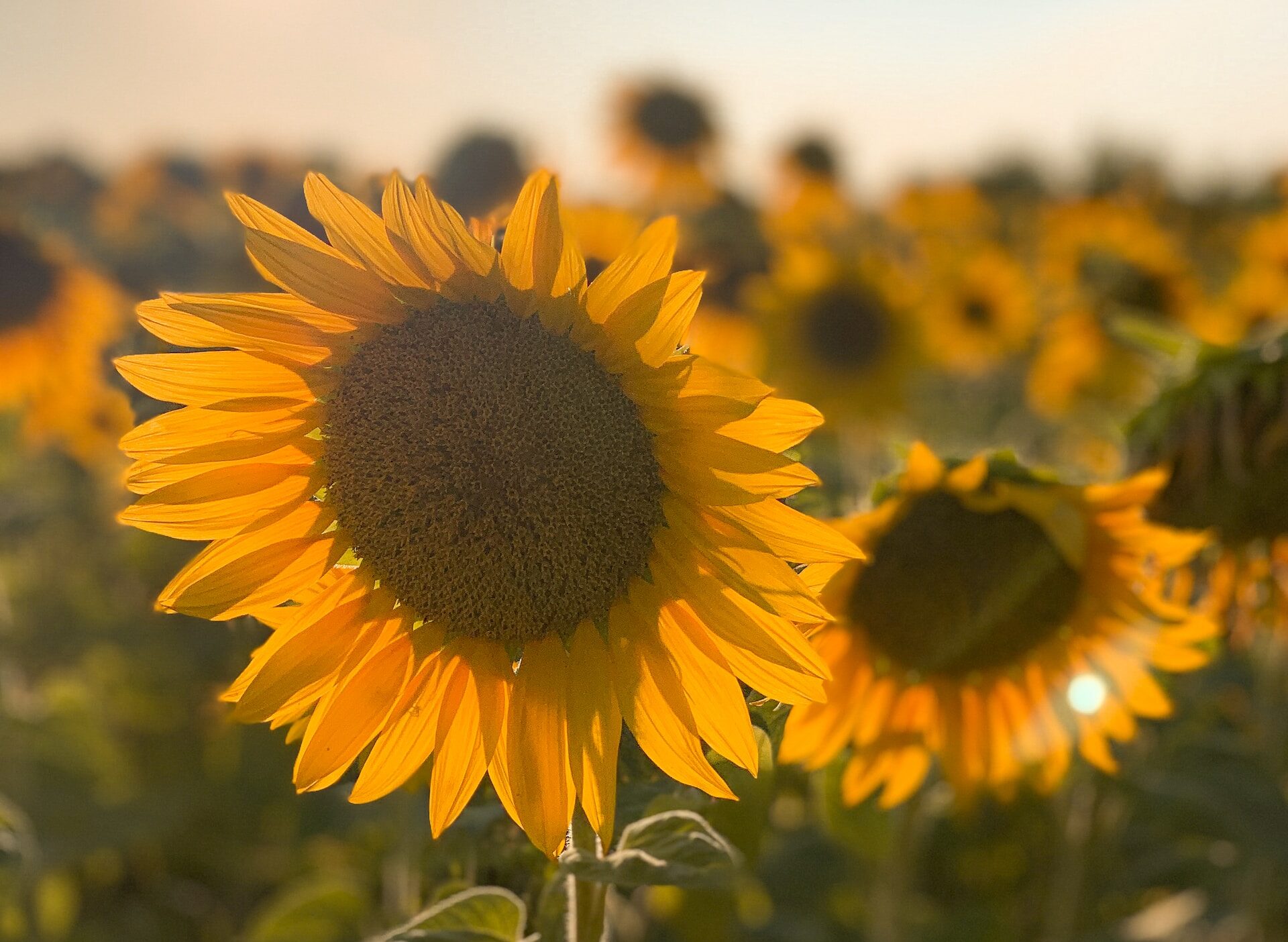by Nicole Yurcaba

“It seems to me, more than ever, that books exist not to be read but to be talked about,” writes Ukrainian novelist Andrey Kurkov in Diary of an Invasion (Deep Vellum, 2023). However, here at Sage Cigarettes, we abide by our own personal version of the Icelandic tradition, Jólabókaflóð–giving books as gifts on Christmas Eve, and we don’t believe the tradition should end at the Christmas season. Therefore, we’re starting 2024 on a very literary note, and our first recommendation comes from Ukraine’s foremost contemporary novelists, Andrey Kurkov, and while his novels are definitely worth a reader’s time, his journal, Diary of an Invasion remarkably captures Ukrainian resilience and fortitude in the everyday lives of Ukrainians enduring the largest ground war on European soil since World War II.
Part of Diary of an Invasion’s charm is its novelist’s-eye view on everything from how social media connects Ukrainians during the war to Kurkov’s own experiences as a Russian-speaking Ukrainian. Kurkov captures these with brilliance and humor, and his knack for taking a satirical look at everything from Ukraine’s new policies on school meals to Putin’s desire to control Ukraine. For example, in one of his early entries, Kurkov comments “I went home and decided to take my mind off the war by looking at Facebook. In the Ukrainian segment, there have always been more posts about cats than about war.” The statement testifies to a social media phenomenon anyone who follows the war may have noticed. On platforms like Instagram and X, accounts like Animals in Ukraine feature daily short clips of Ukrainian soldiers building homes for cats, feeding stray dogs, and adopting other furry companions near or on the battlefield. These humorous, but more significantly human, moments in Kurkov’s entries remind readers that Ukrainians are people, too–a fact that members of America’s Republican Party and people like Elon Musk have apparently forgotten.
As he depicts selfless Ukrainians who offer their homes and apartments to the internally displaced, Kurkov also provides philosophical anecdotes . In one entry, he writes, “War breeds death and at the same time awakens the humanity in people. Suddenly people want to help others, to help those who are in trouble.” In others, he discreetly reminds readers that Ukrainians’ humanity will be remembered in years to come: “Let time and history judge us all. I am glad that in this the most difficult of times, most Ukrainians have maintained their humanity and are trying to help each other.” Thus, Ukrainians’ collective humanity is the essence of Diary of an Invasion.
The socio-political tensions between Russia and Ukraine also hold a paramount place in the book. Kurkov, a Russian language speaker, continually defers to Russia’s ongoing propaganda about how Russian language speakers are oppressed in Ukraine. Since 2014, Russia has pushed this narrative, but as a Russian speaker himself, Kurkov maintains, “This war is not about the Russian language, which I have spoken and used in writing all my life.” Kurkov corrects the narrative and affirms what other analysts, journalists, and policy makers have confirmed: “This war is about the aging Putin’s last chance to fulfill his dream of recreating the USSR or the Russian Empire. Neither one nor the other is possible without Kyiv, without Ukraine.” Kurkov also presents that Putin’s desires form another consequence–forever dividing Russians and Ukrainians, and forming “an iron curtain between Ukrainians and Russians for many years to come.” Therefore, the historical and contemporary socio-political tensions between Russia and Ukraine also hold a paramount place in the book, and unlike technical historical and political texts, Kurkov’s personal approach to a complex situation makes it more accessible for readers still learning about Ukraine’s situation.
The language situation in Ukraine is threaded throughout Kurkov’s entries, and some of his most memorable considerations surround not only the role of literature and books in Ukrainian society, but also the Soviet oppression Ukrainian artists and writers endured under dictators such as Stalin. Kurkov briefly mentions the “countless Ukrainian writers and poets of the 1930s” who “were arrested,” sent to the prison camp on Solovki in the White Sea,” and then “later shot at Sandarmokh.” These nearly 300 writers and poets are known to Ukrainians as “the Executed Renaissance.” Kurkov skillfully weaves this conversation with another about censorship. He acknowledges Ukraine as the place where he has lived “thirty years without censorship” and “without dictatorship,” and for this he is “infinitely grateful.” A simple conversation about gratitude, nonetheless, transforms into another assertion that “if Russia succeeds in seizing Ukraine, all the freedoms that the citizens of Ukraine are so used to will be lost, together with the independence of our state.” What Diary of an Invasion clarifies for readers, too, is that Ukrainians are willing to pay a high price for the freedoms and independence they so cherish.
Despite being written in the initial few months after the war, Diary of an Invasion’s relevance is sure to remain steadfast. Just as the Ukrainian national anthem declares, “Ukraine has not yet perished,” Kurkov reminds readers that “Ukraine will not disappear, not from history textbooks, nor from maps, nor from European and world geopolitics.” Why? Well, Ukrainian valor–in the armed forces, in communities and cities across the country, and even in the diaspora on continents far from Ukrainian soil–as portrayed by Khurkov gives readers even more insight to how fervently Ukrainians in the homeland and abroad love their country.
Believe me. We do.
Nicole Yurcaba (Ukrainian: Нікола Юрцаба–Nikola Yurtsaba) is a Ukrainian (Hutsul/Lemko) American poet and essayist. Her poems and essays have appeared in The Atlanta Review, The Lindenwood Review, Whiskey Island, Raven Chronicles, West Trade Review, Appalachian Heritage, North of Oxford, and many other online and print journals. Nicole teaches poetry workshops for Southern New Hampshire University and is a guest book reviewer for Sage Cigarettes, Tupelo Quarterly, Colorado Review, and The Southern Review of Books.



Add your first comment to this post